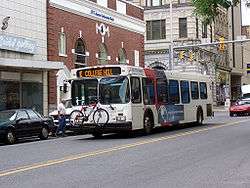Mineola (LIRR station)
Mineola | ||||||||||||||||||||
|---|---|---|---|---|---|---|---|---|---|---|---|---|---|---|---|---|---|---|---|---|
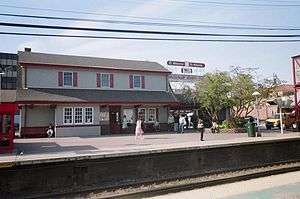 Mineola Station, where a long-standing sign company welcomes commuters to the village of Mineola. | ||||||||||||||||||||
| Location |
Front Street & Mineola Boulevard Mineola, NY | |||||||||||||||||||
| Coordinates | 40°44′25″N 73°38′28″W / 40.740291°N 73.641025°WCoordinates: 40°44′25″N 73°38′28″W / 40.740291°N 73.641025°W | |||||||||||||||||||
| Owned by | MTA | |||||||||||||||||||
| Line(s) | ||||||||||||||||||||
| Platforms | 2 side platforms | |||||||||||||||||||
| Tracks | 2 | |||||||||||||||||||
| Connections |
| |||||||||||||||||||
| Construction | ||||||||||||||||||||
| Parking | Yes | |||||||||||||||||||
| Bicycle facilities | Yes | |||||||||||||||||||
| Disabled access | Yes | |||||||||||||||||||
| Other information | ||||||||||||||||||||
| Fare zone | 4 | |||||||||||||||||||
| History | ||||||||||||||||||||
| Opened | 1837 | |||||||||||||||||||
| Rebuilt | 1872, 1883, 1923, 2001, 2007 | |||||||||||||||||||
| Electrified |
October 1926 750 V (DC) third rail | |||||||||||||||||||
| Previous names | Branch, Hempstead Branch | |||||||||||||||||||
| Traffic | ||||||||||||||||||||
| Passengers (2006) | 10,348[1] | |||||||||||||||||||
| Services | ||||||||||||||||||||
| ||||||||||||||||||||
Mineola is a station on the Main Line of the Long Island Rail Road in the village of Mineola, New York. All trains for the Port Jefferson, Ronkonkoma, and Oyster Bay branches run through this station, as well as a few for the Montauk Branch. As of May 2011, 145 trains stop at this station every weekday,[2] more than any other station east of Jamaica. It is the eighth-busiest station on the LIRR in terms of weekday boardings, with 10,348 boardings per day in 2006.
Location
Mineola lies in the center of the town of the same name. Specifically, it is situated to the west of Mineola Boulevard between Station Road to the south and Front Street to the north.
Transit-oriented development
As one of the LIRR's busiest stations and near the center of Nassau County, the Village of Mineola Planning Committee created a master plan for the town meant to encourage transit-oriented development within a few blocks' radius of the station. Much of the plan involves creating links in the surrounding street grid, streetscape improvements, and pedestrian zones.[3] The Long Island Index, which aggregates data and plans about the island, has listed Mineola as one of the most high-profile targets for smart growth, as of 2010 noting that the town is about halfway through the process of revitalization.[4]
History
Mineola station was originally built on the south side of the tracks in 1837 as "Branch station", then later renamed "Hempstead Branch station" when the Long Island Railroad was expanded to Hicksville. The station was renovated in June 1872, but a second depot was built between May and June 1883. This station was razed in 1923, and the third one was relocated to the north side of the tracks on September 22, 1923.[5] The enclosed shelter was built at the old station house's location (See below). A reconstruction project took place in 2001.
With its connection to the Oyster Bay Branch, the Mineola station has always been a major railroad junction, but even more so in the 19th and much of the 20th Century. On the south side of the station, a wye existed between the power sub-station[6] for a line that connected the West Hempstead Branch with the Oyster Bay Branch.[7] Sometimes referred to as the Garden City Branch, the east branch of this wye began at Third Street then crossed Main Street, then the main line itself before connecting with the Oyster Bay Branch until it was eliminated in 1928.[8] The rest of the line was eliminated in 1966.[9]
Station layout
| 1 | ■ Main Line | toward New York (Merillon Avenue) |
| ■ Montauk Branch | toward New York (Jamaica) | |
| 2 | ■ Main Line | toward Ronkonkoma or Port Jefferson (Carle Place) |
| ■ Oyster Bay Branch | toward Oyster Bay (East Williston) | |
| ■ Montauk Branch | toward Montauk (Hicksville) |
Mineola has two side platforms and two tracks, both slightly-offset platforms long enough to accommodate 12 railway cars. The north platform, next to Track 1, is generally used by westbound trains (toward New York City); the south platform, next to Track 2, is generally used by eastbound trains. The south platform could become an island platform, if a third track on the Main Line is built.
The main station house is on the north side of the tracks, at Front Street and Mineola Boulevard. The station is wheelchair accessible and has a crossover and a grade crossing for pedestrians at the east end. A smaller enclosed shelter is on the opposite (south) side of the tracks. The Oyster Bay Branch splits away at a grade crossing just east of the pedestrian crossing.
Mineola Intermodal Center
Nassau Inter-County Express, or NICE (formerly MTA Long Island Bus), operates bus service to the Mineola Intermodal Center on the south side of the station. Prior to the opening of the intermodal center on October 16, 2006, bus stops were located at Third Street, a block away from the station. Six NICE routes stop there, as well as local taxicab services.
Nassau Inter-County Express routes
| Route | Termini | via | |
|---|---|---|---|
n22 |
Jamaica at 165th Street Bus Terminal |
Hicksville LIRR Station |
|
n22X | |||
n23 |
Terminus | Manorhaven | Mineola Boulevard, Willis Avenue, Main Street (Roslyn), Port Washington Boulevard, New Shore Road |
n24 |
Jamaica at 165th Street Bus Terminal |
Hicksville via Roosevelt Field |
|
| East Meadow via Roosevelt Field | |||
n40 |
Terminus |
Freeport LIRR Station |
|
n41 | |||
References
- ↑ Average weekday, 2006 LIRR Origin and Destination Study
- ↑ "LIRR Timetable for Mineola" (PDF). Retrieved 2011-05-14.
- ↑ "Comprehensive master plan for the Village of Mineola" (PDF). Village of Mineola. November 2005. Retrieved 17 July 2011.
- ↑ "Places to grow: an analysis of the potential for transit-accessible housing and jobs in Long Island's downtowns and station areas" (PDF). Long Island Index. Retrieved 17 July 2011.
- ↑ LIRR Station History (TrainsAreFun.com)
- ↑ Bob Emery Drawing of 1921 Mineola Station Layout from SUNY at Stony Brook (TrainsAreFun.com)
- ↑ Former Mineola to West Hempstead Branch (Unofficial LIRR History Web Site)
- ↑ Bob Emery 1943 drawing, which shows the east leg eliminated in 1928. (TrainsAreFun.com)
- ↑ Mineola Station History (Steve Lynch's LIRR Maps, Photos, Charts, etc. @ TrainsAreFun.com)
External links
![]() Media related to Mineola (LIRR station) at Wikimedia Commons
Media related to Mineola (LIRR station) at Wikimedia Commons
- Official LIRR station information page for Mineola
- Station timetable for Mineola
- Mineola Station and Vicinity (The SubwayNut.com)
- NASSAU Interlocking (The LIRR Today)
- Station House from Google Maps Street View

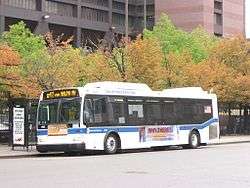
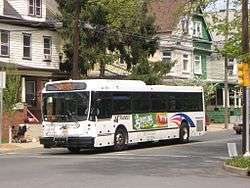
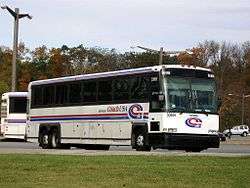
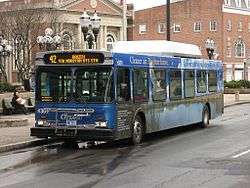
.jpg)
